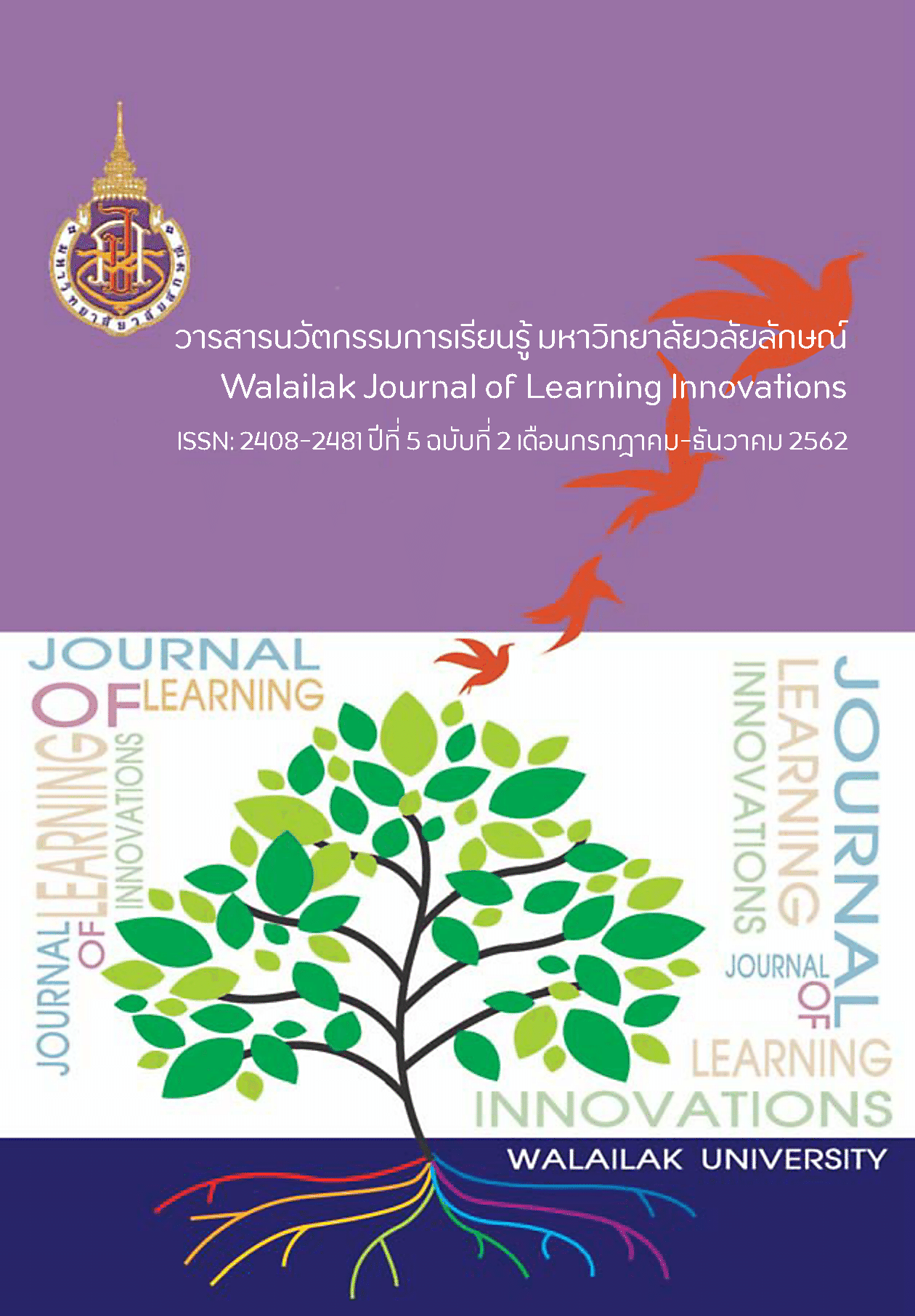Development of Student Achievement and Satisfaction of Cooperative Learning for the Students in Faculty of Education, Nakhon Si Thammarat Rajabhat University: A Case Study of the Preparation of solution in Chemistry Laboratory II Course.
DOI:
https://doi.org/10.14456/jli.2019.10Keywords:
Achievement, Satisfaction, Collaborative learning management, Solution preparationAbstract
This research aims to develop students' academic achievement and satisfaction towards cooperative learning in the course of chemistry laboratory II for the students of the faculty of education, Nakhon Si Thammarat Rajabhat University. The research instrument consisted of 1) the achievement test, 2) the cooperative behavior test, and 3) the student satisfaction questionnaire. The results of this study showed that the cooperative learning management had higher learning achievement after learning at the .05 level. The learners learned the skills of teamwork was a very good level in the average score of 4.48 ± 0.57. Students realized that the success of the work was based on the responsibility of all members, practice observation skills and make notes as appropriate for individual duties. The learners' satisfaction in cooperative teaching was very good level in the average score of 4.53 ± 0.55. Collaborative learning management improves teamwork skills, enhances interaction opportunities among students and make it work faster. This innovation allows students to take more tests, attainment of learning goals and help students to remember the content better.
References
Jandaeng, S. (2013) Phonkān čhatkān rīan dūai chut kānsō̜n bǣp rūammư̄ thī mī tō̜ phon samrit thāngkān rīan læ khwāmsāmāt nai kānthamngān rūam kan wichā witthayāsāt khō̜ng nakrīan chan prathomsưksā pī thī 6 [Effect of learning by co-operative’s instructional package on learning achievement and teamwork’s ability, science subject of Pathomsuksa 6 students]. Veridian E-journal, 6(2), 567-581.
Jatupan, K. & Sanukul, K. (2017). Kānsưksā rūpbǣp kān rīanrū bǣp rūammư̄ rūam čhai nai chan rīan wichā rabop sukkhaphāp kō̜ranī sưksā naksưksā laksūt prakāsanīyabat sāthāranasuk chan sūng theknik phēsatchakam witthayālai kān sāthāranasuksirinthō̜n čhangwat Khō̜n Kǣn [A study of cooperative learning classroom in health system subject among of pharmacy technique students at Sirindhorn College of Public Health Khonkaen. Thailand]. Kān prachum hāt yai wichākān radap chāt læ nānā chāt khrang thī pǣt [The 8th Hatyai National and International Conference] (pp. 524-533) Hatyai, Thailand: Hatyai University.
Kathryn A.S.L. & Carolyn A.S. (2001). Using the Team‐Learning Model in a Managerial Accounting Class: An Experiment in Cooperative Learning. Issues in Accounting Education, 16, 549-567.
Mingsiritham, K. (2009). Development of a Web-Based Learning Model Integrating Cooperative Learning and Collaborative Learning to Enhance Self-Directed Learning of Pre-Service Teacher. (Doctoral dissertation). Chulalongkorn University, Thailand.
Suhendan Er., & Ataç, B.A. (2014). The Attitudes of Students Towards Cooperative Learning in ELT Classes. International Online Journal of Education and Teaching, 1, 34-37.
Tsay, M., & Brady, M. (2012). A Case Study of Cooperative Learning and Communication Pedagogy: Does Working in Teams Make a Difference?. Journal of the Scholarship of Teaching and Learning, 10, 78-89.
Downloads
Published
How to Cite
Issue
Section
License
เนื้อหาและข้อมูลในบทความที่ลงตีพิมพ์ในวารสารนวัตกรรมการเรียนรู้ มหาวิทยาลัยวลัยลักษณ์ ถือเป็นข้อคิดเห็นและความรับผิดชอบของผู้เขียนบทความโดยตรง ซึ่งกองบรรณาธิการวารสาร ไม่จำเป็นต้องเห็นด้วย หรือร่วมรับผิดชอบใดๆ
บทความ ข้อมูล เนื้อหา รูปภาพ ฯลฯ ที่ได้รับการตีพิมพ์ในวารสารนวัตกรรมการเรียนรู้ มหาวิทยาลัยวลัยลักษณ์ ถือเป็นลิขสิทธิ์ของวารสารนวัตกรรมการเรียนรุ้ มหาวิทยาลัยวลัยลักษณ์ หากบุคคลหรือหน่วยงานใดต้องการนำทั้งหมดหรือส่วนหนึ่งส่วนใดไปเผยแพร่ต่อเพื่อกระทำการใดๆ จ้อต้องได้รับอนุญาตเป็นลายลักษณ์อักษรจากวารสารนวัตกรรมการเรียนรู้ มหาวิทยาลัยวลัยลักษณ์ก่อนเท่านั้น

